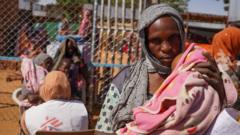The rollback of U.S. foreign assistance has led to widespread famine and suffering in Sudan, exemplified by the tragic deaths of acutely malnourished infants in Khartoum. The closure of essential soup kitchens has exacerbated the humanitarian disaster affecting millions.
Humanitarian Crisis Deepens in Sudan Amid Aid Cuts

Humanitarian Crisis Deepens in Sudan Amid Aid Cuts
The severe impact of U.S. aid cutbacks under President Trump is devastating vulnerable populations in war-torn Sudan, where hunger and malnutrition rates soar as resources dwindle.
Sudan's ongoing civil war and the recent reductions in U.S. foreign assistance have resulted in a dire humanitarian situation, particularly for the nation's most vulnerable populations. The chilling effects of aid cuts initiated by President Trump are starkly illustrated in areas like Jereif West in Khartoum, where mothers like Khadija Mousa desperately attempt to care for their severely malnourished children.
Reports confirm a devastating trend: families have lost their safety net as dozens of soup kitchens—crucial lifelines amid endless conflict—have shut down following the financial withdrawal. In one heartbreaking instance, twelve acutely malnourished infants, including 18-month-old Abdo who was rushed to a clinic, succumbed to starvation in the weeks following the aid reductions. Local healthcare professionals and aid workers are lamenting the needless deaths, attributing them directly to the loss of American support that previously kept many at least minimally fed.
Duaa Tariq, an aid worker in Khartoum, poignantly remarked on the catastrophic ramifications of the loss of U.S. assistance. The fallout is evident in the staggering statistic that over 25 million Sudanese—approximately half of the nation's populace—are now acutely hungry. This crisis has seen families fragmented and community support structures decimated, plunging many into despair and hopelessness.
As bombs continue to rain down and gunfire echoes across the streets of Sudan’s capital, the once-prominent American-funded relief operations have all but disappeared, leaving millions to fend for themselves in an already chaotic environment. The report paints a grim picture of the state of Sudan—a dire call for regional and international aid to address the humanitarian catastrophe unfolding before the world's eyes.
Reports confirm a devastating trend: families have lost their safety net as dozens of soup kitchens—crucial lifelines amid endless conflict—have shut down following the financial withdrawal. In one heartbreaking instance, twelve acutely malnourished infants, including 18-month-old Abdo who was rushed to a clinic, succumbed to starvation in the weeks following the aid reductions. Local healthcare professionals and aid workers are lamenting the needless deaths, attributing them directly to the loss of American support that previously kept many at least minimally fed.
Duaa Tariq, an aid worker in Khartoum, poignantly remarked on the catastrophic ramifications of the loss of U.S. assistance. The fallout is evident in the staggering statistic that over 25 million Sudanese—approximately half of the nation's populace—are now acutely hungry. This crisis has seen families fragmented and community support structures decimated, plunging many into despair and hopelessness.
As bombs continue to rain down and gunfire echoes across the streets of Sudan’s capital, the once-prominent American-funded relief operations have all but disappeared, leaving millions to fend for themselves in an already chaotic environment. The report paints a grim picture of the state of Sudan—a dire call for regional and international aid to address the humanitarian catastrophe unfolding before the world's eyes.


















